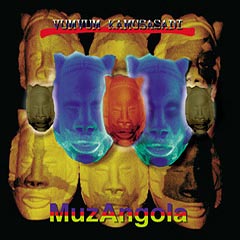With MuzAngola, the Angolan Vum Vum Kamusasadi
presents his first album release ever
 As one of many CDs from Tropical Music's edition Afrolusamerica, Vum Vum Kamusadi's album MuzAngola offers pop music from Africa with Portuguese and Brazilian influences. This late debut of the artist it is a very dense and personal album full of poetic power - an opus in 10 songs.
As one of many CDs from Tropical Music's edition Afrolusamerica, Vum Vum Kamusadi's album MuzAngola offers pop music from Africa with Portuguese and Brazilian influences. This late debut of the artist it is a very dense and personal album full of poetic power - an opus in 10 songs.
The life of Vum Vum Kamusasadi
Vum Vum Kamusasadi was born in 1943 in Luanda/Angola - a Portuguese colony then. Kamusasadi belongs to a Bantu tribe where the babies that stay longer than nine months in the uterus of their mothers are called Kinvungi. In Kamusasadi's case this later was transformed to Vun and then to Vum Vum.
In 1958 he was a dancer in the Carnaval group Escola Do Semba. Later Vum Vum worked in the theatres and dance groups and played Rock 'n' Roll with African flair in his spare time, i.e. with his band Os Eletrónicos in 1965.
In 1968 he went to Lisbon, following an invitation of the Vasco Morgado theatre to work there. At first, he stayed in Portugal - but decided to settle in Stuttgart/Germany later, from where he travels to his concerts. At present, Vum Vum Kamusasadi is working at his first book of poems.
The music of Vum Vum Kamusasadi
Semba, Kabetula, Kilapanga - these are some of the Angolan rhythms Vum Vum Kamusasadi is using. The manifold Bantu culture of his home country also has a wide spectre of musical forms of expressions. Kamusasadi is using them but also combining these with modern structures of Rock or Brazilian patterns. After all, the millions of Bantu-slaves in Brazil had the strongest influence in the genesis of Afro Brazilian culture.
In Portugal, Vum Vum Kamusasadi came in touch with Brazilian music. Choro and Chorinho on this album are his references for Brazil.
The lyrics of Vum Vum Kamusasadi
The mother tongue of Vum Vum Kamusasadi is the Kimbundu of the Bantu. He uses it in most of his songs on this CD. Portuguese is the language of the former colonial power and still official language in Angola. With pictures, stories, emotions Kamusasadi is mostly introducing autobiographic material: i.e. the mother (Monami N'Gongo), solidarity (Salalé), social criticism (Era uma vez), the stranger in Europe (Tombar no Soweto) or Africa.
More info on Vum Vum Kamusasadi - MuzAngola
More info on Afrolusamerica
